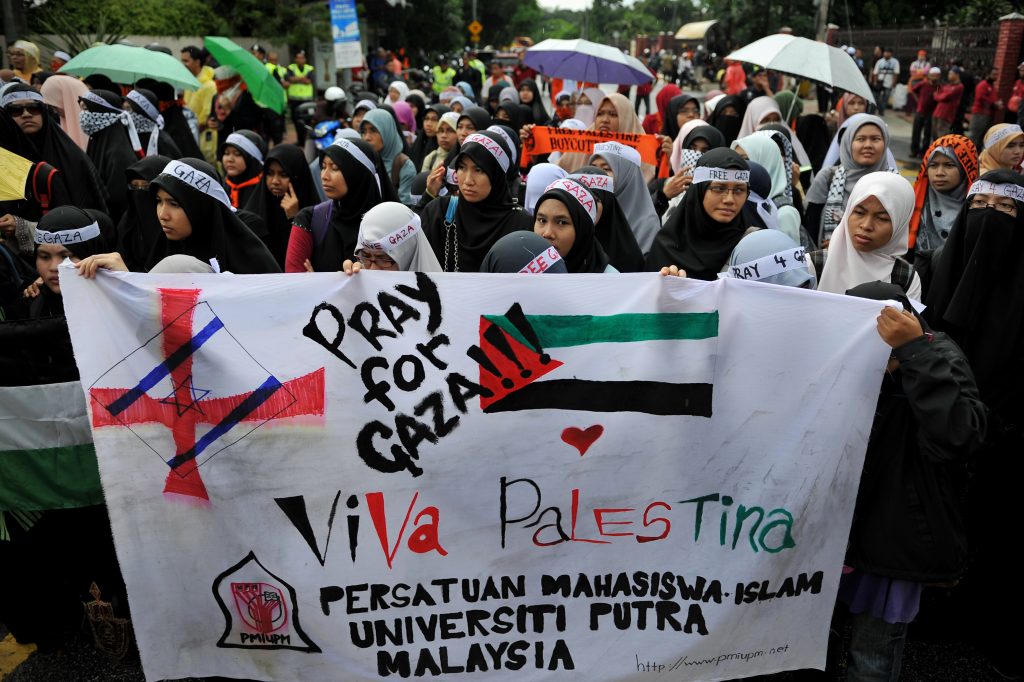Australia/Israel Review
Asia Watch: Across the spectrum
Nov 2, 2023 | Michael Shannon

The shocking Hamas onslaught upon Israel and the resulting military response prompted a wide range of responses across Southeast Asia. Reviewing the reactions, some appear motivated by political and religious ideology, others by pragmatism and direct people-to-people connections.
In the former camp is Indonesia. President Joko “Jokowi” Widodo, leader of the world’s most populous Muslim-majority country, urged an end to the bloodshed, and added, “The root cause of the conflict, which is the occupation of Palestinian land by Israel, must be resolved immediately in accordance with the parameters that have been agreed upon by the UN.”
Jokowi said his government was working to protect Indonesian citizens in Palestinian territories, especially 10 in Gaza. The foreign ministry said there were 275 Indonesians in Israel and Palestinian areas, with most of them visiting for religious purposes.
On the street, several hundred citizens in Jakarta – many holding Palestinian flags – protested outside the US Embassy, where they denounced Israel as the “real terrorist”, prayed to “expel Zionist Israel from Palestinian soil” and set Israeli flags ablaze. Several Islamic organisations were involved, reportedly including members of the banned Islam Defenders’ Front.
“Today we hear the call of jihad,” a female protest leader told the crowd. “If Allah says we have to fight against the Jews, we are ready to go to Palestine.”
Likewise, Malaysia’s immediate response to Hamas’ attacks was to reiterate its “solidarity with the struggles of the Palestinian people.” In a post on X (Twitter), PM Anwar Ibrahim said, “The confiscation of land and property belonging to the Palestinian people is done relentlessly by the Zionists. As a result of this injustice, hundreds of innocent lives were sacrificed.”
Anwar did not comment about the atrocities carried out by Hamas terrorists against Israeli civilians.
Meanwhile, after Friday prayers on Oct. 13 in Kuala Lumpur, a crowd of around 15,000 assembled to condemn Israel. According to the Malay Mail, protesters wore Palestinian keffiyeh scarves and held aloft placards reading Israel cuak (“Israel is frightened”). It reported that two effigies draped in the Israeli flag were also set ablaze amidst chants of Hidup Palestin (“long live Palestine”) and Hancur Zionist (“crush the Zionists”).
The usually rancorous Malay political dialogue was suspended for rare unanimity, with prominent politicians from across the political spectrum, including former prime ministers Muhyiddin Yassin and Mahathir Mohamad, plus leaders from the Islamist party PAS, the ethnic Chinese-oriented Democratic Action Party, the United Malays National Organisation and several members of PM Anwar’s cabinet in attendance.
“For decades they have suffered,” Muhyiddin told the crowd. “Today’s gathering is a testament to our unwavering stance, regardless of political affiliations or whether you are Muslim or non-Muslim, we must make our stance known against the atrocities of the Zionist regime imposed upon the Palestinians.”
For its part, communist-ruled Vietnam said that it was “profoundly concerned” and broadly took a stance that appeared much closer to the position of powers such as China and Russia, which did not squarely side with Israel.
Other countries in region could see Hamas’ violence for what it was.
Singapore said it strongly condemned Hamas’ rocket and terror attacks, while new Thai Prime Minister Srettha Thavisin denounced them as inhumane, extending his “deepest condolences to the government and people of Israel”.
The Thai foreign ministry further called upon “all parties involved to refrain from any actions that would further escalate tensions and [condemned] any use of violence and indiscriminate attacks.”
Among foreign countries, Thailand is perhaps the most affected in terms of lives lost and in the number of people taken hostage. An estimated 30,000 Thais live in Israel, many working as farm labourers – 29 were killed by Hamas gunmen, according to the Foreign Ministry, which said another 17 Thai citizens were being held hostage by Hamas and another 16 had been injured.
The Philippines is similarly affected. There are approximately 40,000 Filipinos in Israel, but only 25,000 are legally documented, according to labour and migrant groups. Three Filipinos have been killed in the violence, while two remained unaccounted for and 20 others were rescued by Israeli forces, Philippines officials said.
At the political level, the Philippines’ long history of support for the Jewish state was reflected in the words of President Ferdinand Marcos Jr: “My heart is heavy upon hearing confirmation of the deaths of two Filipinos in Israel. The Philippines condemns these killings and stands firmly against the ongoing terror and violence.”
However, a later televised comment that if he were Israeli PM Netanyahu, he would turn Gaza into “the world’s biggest cemetery,” drew criticism from Muslim leaders in the nation’s south.






